4BM3U3(Period 4)
- 格式:ppt
- 大小:18.35 MB
- 文档页数:20

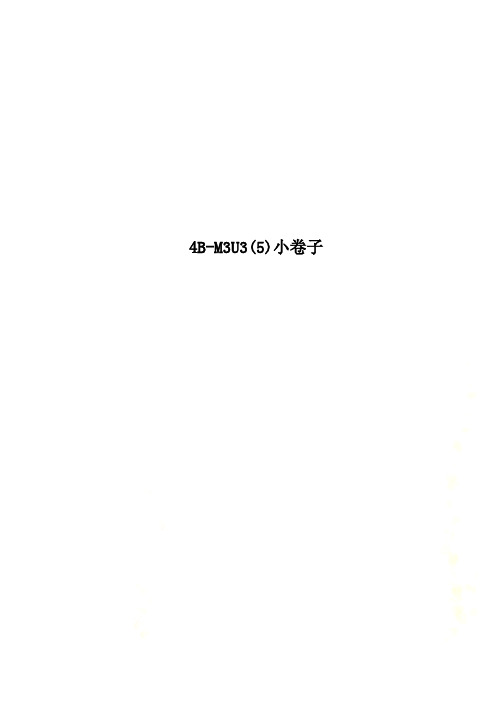
4B-M3U3(5)小卷子Module 3 Things around usUnit 3 Days of the week (1)Ⅰ. Read and write(正确抄写下列单词、词组和句子,抄写句子时注意大小写和标点符号):May busy usually like reading on Monday afternoon_____________________________________________________________ what do you often do in autumn we often fly the kites_____________________________________________________________Ⅱ. Look and write(看一看,写一写,写出有关星期的单词,每线一词,首字母已给):Ⅲ. Choose the best answer(选择最佳答案,将字母代号写在前面的括号内):( ) 1. __________ is the first day of the week.A. MondayB. TuesdayC. Sunday ( ) 2. There are __________ days in a week.A. sixB. sevenC. eight( ) 3. Peter __________ cute and beautiful parrots.A. likeB. is likeC. likes( ) 4. I always go to the park __________ Thursday.A. onB. toC. in( ) 5. Thursday comes after _______________.A. TuesdayB. WednesdayC. Friday( ) 6. Saturday comes before(在之前)__________.A. FridayB. SundayC. Wednesday ( ) 7. Oh, it’s half past eight __________ the morning.A. inB. onC. at( ) 8. I don’t like reading books. I __________ go to the library.A. alwaysB. oftenC. neverName How often Activity WhenMary often play basketball on Saturday Peter never ride a bicycle at weekends Linda sometimes play badminton in the afternoon Ben usually swim in the sea in winter Louise always cook dinner on Tuesday Model: Mary often plays basketball on Saturday.Look! Mary is playing basketball now.1. ______________________________________________________________________________________________________2. ______________________________________________________________________________________________________3. ______________________________________________________________________________________________________4. ______________________________________________________________________________________________________Ⅴ. Answer the questions(可以发挥你的想象来回答下列问题,每线词数不限):1. What do you always do? __________________________________2. What does your father usually do? __________________________3. What does your mother often do? ___________________________4. What do you never do? ___________________________________5. What do your parents sometimes do? ________________________6. What does your friend never do? ____________________________Module 3 Things around usUnit 3 Days of the week (2)Ⅰ. Look and write (根据图意,写出相应的频率副词,首字母已给,每线一词):1.a_____________ 2.u_____________ 3.o_____________ 4.s_____________ 5.n_____________Ⅱ. Read and circle (读一读,圈出下列各组中在意义上属于不同类的单词,圈在字母代号上):1. 2. 3. 4. 5.Ⅲ. Read and write (用所给单词的适当形式填空,每线一词):1. There are seven _________ (day) in a week. What _________ (be) they?2. Peter often ________ (go) to school on foot. He _________ (like) walking.3. --- What ’s ___________ (you) name? --- __________ (I) name is Sally.4. --- What ___________ they never _________ (do)? A. Monday B. today C. Tuesday A. on B. in C. no A. school B. library C. Friday A. Sunday B. sun C. star A. morning B. running C. evening--- They never ____________ (watch) TV.5. --- What __________ you ___________ (do) now?--- I __________ ___________ (read) English books.Ⅳ. Rewrite the sentences(按要求改写下列句子,每线一词):1. I usually play badminton with my classmates.(根据划线提问)________ ________ you ________ ________ with your classmates?2. There are four seasons in a year.(改为一般疑问句)__________ ___________ __________ ___________ in a year?3. Please go to the Chinese chess club.(改为否定句)Please ________ ________ to the ________ ________ _________. 4. He is drawing pets in the living room.(根据划线部分提问)_________ _________ ___________ in the living room?5. I go to school. It’s Monday afternoon.(合并成一句,但意思不变)I _________ __________ _________ _________ Monday afternoon.6. What do you never do?(根据实际情况回答)_______ ________ _______ __________.Ⅴ. Reading comprehension(阅读理解):Hello, I am Lily, a student at Yellow Primary school. I am eleven years old. I like playing volleyball. It’s my favourite sport.I go to school from Monday to Friday. l often go to the school library on Monday afternoon. I always go to the music club on Tuesday. I sometimes go home early on Wednesday afternoon. I like playing Chinese chess. I often go to the Chinese chess club with my classmates on Thursday afternoon. I go home at three thirty on Friday afternoon. I always play table tennis with my friends then. I enjoy my school life. Part 1 Read and judge(阅读短文,判断正误,用T或F表示)( ) 1. Lily is studying(学习)at a middle school.( ) 2. Her favourite sport is playing volleyball.( ) 3. She goes to the library on Tuesday afternoon.( ) 4. She doesn’t like playing Chinese chess.( ) 5. She’s busy, but she’s happy.Part 2 Answer the questions(根据短文,回答问题,每线词数不限):1. How old is Lily? __________________________________________2. Does she go to school at weekends? _________________________3. Does she always go to the music club? _______________________4. When does she go home on Friday? ______________________________5. Does she like her school life? ____________________Module 3 Things around usUnit 3 Days of the week (3)Ⅰ. Read and write(正确抄写下列单词、词组和句子,抄写句子时注意大小写和标点符号):Betty Wednesday sometimes go to school play with Sally____________________________________________________________ do you never swim in the sea yes i do____________________________________________________________ Ⅱ. Read and write(读一读,按要求写出下列单词的变化形式):1. TV(复数形式)__________2. week(复数形式)___________3. he(所有格)__________4. one (序数词)___________5. go(第3人称单数形式)________6. Tuesday(同类词)__________7. on(同类词)__________8. read(现在分词)__________Ⅲ. Read and judge(读一读,判断下列各组单词划线部分的发音,用☺或☹表示):1. 2. 3. 4.May play day Monday today Sunday birthday canⅣ. Read and write(读一读,选出适当的单词完成句子,答案写在横线上,每词限用一次):on in from to with behind1. Look, the sun rises ___________ the hill. It’s red.2. I always go to the beach __________ the morning.3. Peter goes to school __________ Monday __________ Friday.4. Let’s play basketball __________ Sally and Jill.5. She never watches TV __________ Saturday evening.Ⅴ. Read and match(读一读,应答配对,将字母代号写在前面的括号内):( ) 1. What do you usually do? A. They sometimes play chess. ( ) 2. What does she often do? B. I usually play with Danny. ( ) 3. What do they sometimes do? C. I always go to the zoo. ( ) 4. What does he never do? D. He never read books.( ) 5. What do you always do? E. She often cooks dinner.Ⅵ. Read and choose the best answer(阅读短文,选择最佳答案,将字母代号写在前面的括号内):The days of the week are having a party. Mr Sunday has a black big coat and a yellow long hat. 'How do you do?’ he says, and bows.Mr Monday is a happy young man. He says, 'I like singing. I love music!' Mr Tuesday is tall and strong. He says, 'I love playing sports.' ‘I’m in the middle of the week,' says Mr Wednesday. He always smiles. Miss Thursday is very clever. She really loves to read. Miss Friday a little shy and Mr Saturday is very kind. He says, 'Let me get everyone a drink.’ So the days of the week start their party.( ) 1. The days of the week are __________.A. having a meetingB. having breakfastC. having a party( ) 2. Mr Sunday’s hat is __________.A. yellowB. longC. Both A and B ( ) 3. Mr Monday isn’t __________. A. old B. happy C. young ( ) 4. __________ is in the middle of the week.A. Miss ThursdayB. Mr WednesdayC. Mr Tuesday ( ) 5. Is it a happy family? A. Yes. B. No. C. It’s a happy one.Ⅶ. Look and write(根据提供的Kitty的信息,回答下列问题,每题词数不限):1. What does Kitty often do? _____________________________________2. Does she never watch TV? ____________________________________3. What does she sometimes do? _________________________________4. Does she always read and write? _______________________________5. What does she usually do? ____________________________________Module 3 Things around usUnit 3 Days of the week (4)Ⅰ. Look and write(看一看,根据图示和图片完成句子,每线一词):1.2.3.4.5. The boy a__________ gets up at half p__________ seven in the The children u_____________ play table t____________ together. Ben o__________ watches t_______________ at weekends.Kitty s_____________ r_____________ books in the bedroom.Usually watch TVSometimes help MumAlways read and writeNever cook dinnerOften sing and danceHe n___________ skips a rope. He d____________ like skipping aⅡ. Choose the best answer(选择最佳答案,将字母代号写在前面的括号内):( ) 1. I read English __________ Monday __________ Friday.A. on... onB. from... onC. from... to( ) 2. Peter and Jack like __________.A. swimB. swimmingC. swim in the sea ( ) 3. Let’s chat together __________ Wednesday evening.A. onB. inC. at( ) 4. __________ is the second day of the week.A. SundayB. MondayC. Tuesday( ) 5. There are __________ weeks in a year.A. 51B. 52C. 53( ) 6. Today is Tuesday. Tomorrow will be __________.A. WednesdayB. ThursdayC. SaturdayⅢ. Rewrite the sentence(按要求改写下列句子,每线一词):1. I often watch TV after work.(将I改成Peter,其余作相应变化)Peter __________ __________ ___________ after work.2. Jim always goes to Beijing.(改为一般疑问句)_________ Jim __________ _________ __________ __________?3. She eats meat and fish.(根据划线部分提问)__________ ___________ _________ __________?4. Sally often sings. Billy often sings.(合并成一句,但意思不变)Sally ________ ________ ________ _________.5. It’s five forty-five.(换种说法,但意思不变)It’s ________ ________ ________ __________.6. What do you always do?(根据实际情况回答)__________ __________ __________ __________.Ⅳ. Read and number(读一读,填上适当的句子完成对话,每句限用一次):A. I have a lovely pet.B. What do you do there?C. Is the park nice?D. What do you often do on Sunday?E. Sometimes I skip a rope.A: Good morning, Kitty. B: Good morning, Jack.A: (1) _____________________ B: I often go to the park with my parents.A: (2) _______________________B: Sometimes I walk a dog. Sometimes I ride my bicycle. (3) _____________A: What activities do you like best?B: I like walking a dog. (4) __________ It likes eating dog food. It can run fast.A: (5) ____________________________ B: I think so.Ⅴ. Look, read and write(看一看,读一读,写一写,每线一词):1. --- Who is he? --- He is Spaceboy.--- __________ he eat rice?--- No, he __________ ___________ rice.2. --- Is she skygirl? --- Yes, ________ is.--- Where is she?--- She’s ________ ________ ________ the cinema.She __________ goes there because she likes films.Module 3 Things around usUnit 3 Days of the week (5)Ⅰ. Read and write(正确抄写下列单词、词组和句子,抄写句子时注意大小写和标点符号):Paul Thursday week on Saturday afternoon Chinese chess club_____________________________________________________________ what does peter always do he always goes to the library _____________________________________________________________Ⅱ. Read and write(读一读,用适当的单词填空,每线一词):1. There are __________ days in a __________. I like Saturday.2. Danny often __________ to the school library. He __________ reading.3. __________ is the first __________ of the week.4. I __________ do my homework in the __________.5. __________ Friday, I play __________ with my parents. It’s interesting.Ⅲ. Read and write (阅读短文,填入适当的单词,使其内容通顺,每线一词):A: What __________ you always do?B: _______ always ________ ________ the badminton club. I __________ __________ badminton.A: __________ __________ your mother __________ __________?B: __________ usually goes to the supermarket __________ Sunday. A: __________ is the supermarket?B: It’s __________ __________ __________ the park.Ⅳ. Look, read and number(读一读,连一连,将星期的编号写在相应的空格内):1. --- What do you like doing? --- I like playing volleyball.--- When do you often play it? --- Every Tuesday afternoon.2. --- Do you sometimes play badminton? --- Yes, I do.--- Do you play it on Thursday? --- No, I play it on Friday morning.3. --- What are you doing now? --- I’m playing football.--- Do you always play it on Thursday? --- Yes, I do.4. --- Can you play table tennis? --- No, but I can play basketball.--- When do you play basketball? --- On Wednesday evening.A. B. C. D.1. 2. 3. 4.星期二星期三星期四星期五( ) ( ) ( ) ( )Ⅴ. Read and judge(阅读对话,判断正误,用T或F表示):Peter goes to school from Monday to Friday. He’s a good student. He likes reading. He often goes to the school library on Monday afternoon. He always plays basketball with his classmates on Tuesday afternoon. On Wednesday and Thursday afternoon, he usually goes to the Chinese chess club. He likes playing chess. He goes home at two thirty on Friday afternoon. He often plays with Sally and Paul at home. At weekends, Peter’s family sometimes go to Rainbow Park. They always have a good time there.( ) 1. Peter goes to school at weekends.( ) 2. He doesn’t like reading.( ) 3. He never plays basketballs on Tuesday afternoon.( ) 4. He often goes to the school library on Monday.( ) 5. His family sometimes go to the park on Saturday or on Sunday.Always Usually Often Sometimes Never SundayTuesdayThursdayFridaySaturdayHello, this is me.______________________________________________________________ ______________________________________________________________ ______________________________________________________________Module 3 Things around usUnit 3 Days of the week (1)Ⅰ. May busy usually like reading on Monday afternoon What do you often do in autumn? We often fly the kites.Ⅱ. 1. Monday 2. Tuesday 3. Wednesday 4. Thursday 5. Friday 6. Saturday 7. SundayⅢ. 1. C 2. B 3. C 4. A 5. B 6. B 7. A 8. CⅣ. 1. Peter never rides a bicycle at weekends.Look! Peter is riding a bicycle now.2. Linda sometimes plays badminton in the afternoon.Look! Linda is playing badminton now.3. Ben usually swims in the sea in winter.Look! Ben is swimming in the sea now.4. Louise always cooks dinner on Tuesday.Look! Louise is cooking dinner now.Ⅴ. OmittedModule 3 Things around usUnit 3 Days of the week (2)Ⅰ. 1. always 2. usually 3. often 4. sometimes 5. neverⅡ. 1. B 2. C 3. C 4. A 5. BⅢ. 1. days, are 2. does, likes 3. your, My 4. do, do, watch 5. are, doing, am, readingⅣ. 1. What, do, usually, do 2. Are, there, four, seasons 3. don’t, go, Chinese, chess, club 4. What’s, he, doing 5. go, to, school, on 6. OmittedⅤ. Part 1 1. F 2. T 3. F 4. F 5. TPart 2 OmittedModule 3 Things around usUnit 3 Days of the week (3)Ⅰ. Betty Wednesday sometimes go to school play with Sally Do you never swim in the sea? Yes, I do.Ⅱ. 1. TVs 2. weeks 3. his 4. first 5. goes 6. Omitted 7. Omitted 8. readingⅢ. 1. ☺ 2. ☹ 3. ☹ 4. ☹Ⅳ. 1. behind 2. in 3. from, to 4. with 5. onⅤ. 1. B 2. E 3. A 4. D 5. CⅥ. 1. C 2. C 3. A 4. B 5. AⅦ. 1. She often sings and dances.2. No, she doesn’t. She never cooks dinner.3. She sometimes helps Mum.4. Yes, she does.5. She usually watches TV.Module 3 Things around usUnit 3 Days of the week (4)Ⅱ. 1. always, past 2. usually, tennis 3. often, television 4. sometimes, reads 5. never, doesn’tⅡ. 1. C 2. B 3. A 4. B 5. B 6. AⅢ. 1. often, watches, TV 2. Does, always, go, to Beijing 3. What, does, she, eat 4. and, Billy, often, sing 5. a, quarter, to, six 6. Omitted Ⅳ. 1. D 2. B 3. E 4. A 5. CⅤ. 1. Does, never, eats 2. she, in, front, of, usuallyModule 3 Things around usUnit 3 Days of the week (5)Ⅰ. Paul Thursday week on Saturday afternoon Chinese chess clubWhat does Peter always do? He always goes to the library.Ⅱ. OmittedⅢ. 1. do 2. I 3. go 4. to 5. like 6. playing 7. What 8. does 9. usually 10. do 11. She 12. on 13. Where 14. in 15. front 16. of Ⅳ. 1. C 2. A 3. B 4. DⅤ. 1. F 2. F 3. F 4. T 5. TⅥ. Omitted。
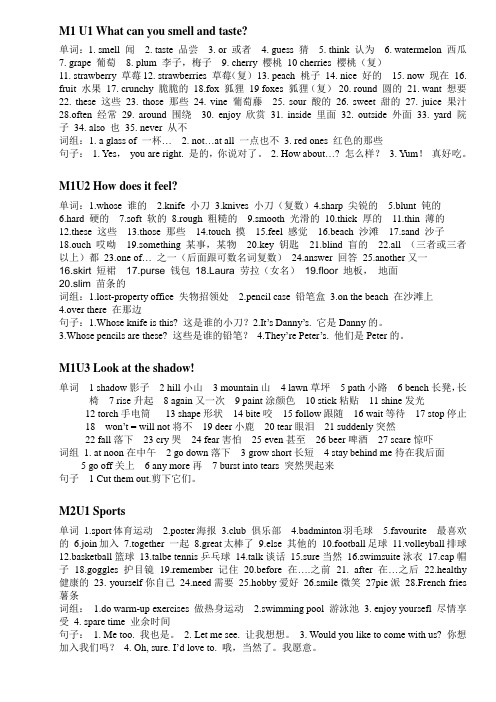
M1 U1 What can you smell and taste?单词:1. smell 闻 2. taste 品尝 3. or 或者 4. guess 猜 5. think 认为 6. watermelon 西瓜7. grape 葡萄8. plum 李子,梅子9. cherry 樱桃10 cherries 樱桃(复)11. strawberry 草莓12. strawberries 草莓(复)13. peach 桃子14. nice 好的15. now 现在16. fruit 水果17. crunchy 脆脆的18.fox 狐狸19 foxes 狐狸(复)20. round 圆的21. want 想要22. these 这些23. those 那些24. vine 葡萄藤25. sour 酸的26. sweet 甜的27. juice 果汁28.often 经常29. around 围绕30. enjoy 欣赏31. inside 里面32. outside 外面33. yard 院子34. also 也35. never 从不词组:1. a glass of 一杯… 2. not…at all 一点也不 3. red ones 红色的那些句子:1. Yes,you are right. 是的,你说对了。
2. How about…? 怎么样? 3. Yum!真好吃。
M1U2 How does it feel?单词:1.whose 谁的 2.knife 小刀3.knives 小刀(复数)4.sharp 尖锐的 5.blunt 钝的6.hard 硬的7.soft 软的8.rough 粗糙的9.smooth 光滑的10.thick 厚的11.thin 薄的12.these 这些13.those 那些14.touch 摸15.feel 感觉16.beach 沙滩17.sand 沙子18.ouch 哎呦19.something 某事,某物20.key 钥匙21.blind 盲的22.all (三者或三者以上)都23.one of…之一(后面跟可数名词复数)24.answer 回答25.another又一16.skirt 短裙17.purse 钱包ura 劳拉(女名)19.floor 地板,地面20.slim 苗条的词组:1.lost-property office 失物招领处 2.pencil case 铅笔盒 3.on the beach 在沙滩上4.over there 在那边句子:1.Whose knife is this? 这是谁的小刀?2.It’s Danny’s. 它是Danny的。
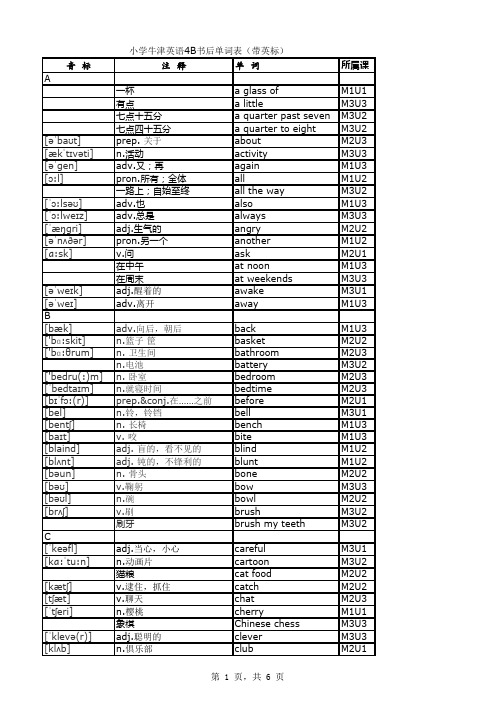
小学牛津英语4B书后单词表(带英标)音标注释单词所属课A一杯 a glass of M1U1有点 a little M3U3七点十五分 a quarter past seven M3U2七点四十五分 a quarter to eight M3U2 [əˈbaʊt]prep. 关于about M2U3 [ækˈtɪvəti]n.活动activity M3U3 [əˈgen]adv.又;再again M1U3 [ɔ:l]pron.所有;全体all M1U2一路上;自始至终all the way M3U2 [ˈɔ:lsəʊ]adv.也also M1U3 [ˈɔ:lweɪz]adv.总是always M3U3 [ˈæŋgri]adj.生气的angry M2U2 [əˈnʌðər]pron.另一个another M1U2 [ɑ:sk]v.问ask M2U1在中午at noon M1U3在周末at weekends M3U3 [əˈweɪk]adj.醒着的awake M3U1 [əˈweɪ]adv.离开away M1U3 B[bæk]adv.向后,朝后back M1U3 ['bɑ:skit]n.篮子筐basket M2U2 ['bɑ:θrum]n. 卫生间bathroom M2U3 n.电池battery M3U2 ['bedru(:)m]n. 卧室bedroom M2U3 [ˈbedtaɪm]n.就寝时间bedtime M2U3 [bɪˈfɔ:(r)]prep.&conj.在……之前before M2U1 [bel]n.铃,铃铛bell M3U1 [bentʃ]n. 长椅bench M1U3 [baɪt]v. 咬bite M1U3 [blaind]adj. 盲的,看不见的blind M1U2 [blʌnt]adj. 钝的,不锋利的blunt M1U2 [bəun]n. 骨头bone M2U2 [bəʊ]v.鞠躬bow M3U3 [bəʊl]n.碗bowl M2U2 [brʌʃ]v.刷brush M3U2刷牙brush my teeth M3U2 C[ˈkeəfl]adj.当心,小心careful M3U1 [kɑ:ˈtu:n]n.动画片cartoon M3U2猫粮cat food M2U2 [kætʃ]v.逮住,抓住catch M2U2 [tʃæt]v.聊天chat M2U3 [ˈtʃeri]n.樱桃cherry M1U1象棋Chinese chess M3U3 [ˈklevə(r)]adj.聪明的clever M3U3 [klʌb]n.俱乐部club M2U1[ˈkʌləfl]adj.色彩缤纷的colourful M4U2 [kʊk]v.烹饪cook M2U3 [ˈkrʌntʃi]adj.(指食物)爽脆的crunchy U1U1 [kraɪ]v.哭cry M3U1 [kju:t]adj.可爱的cute M2U2 D[dɪə(r)]n.鹿deer M1U3 [ˈdɪnə(r)]n.主餐,正餐dinner M2U3狗粮dog food M2U2 [ˈdɔ:bel]n.门铃doorbell M3U1 [daʊn]adv.向下,朝下 prep.沿着down M1U3 [dəʊz]v.打盹儿,小睡doze M3U1龙舟赛dragon boat race M4U2把……赶走drive ……away M4U3 [drʌm]n. 鼓drum M4U1 ['dʌkliŋ]n. 小鸭子duckling M4U3 [ˈdʌmplɪŋ]n.饺子,汤团dumpling M4U2 [ˈdjʊərɪŋ]prep.在……期间during M4U2 E[ɪnˈdʒɔɪ]v.享受……的乐趣enjoy M2U1 [ˈeksəsaɪz]n.运动,训练活动exercise M2U1 F童话fairy tale M2U3 [ˈfestɪvl]n.节日festival M4U2 [ˈfɪnɪʃ]v.完成,做完finish M3U2 ['faɪəwɜ:ks]n.烟花表演fireworks M4U2 [fɪʃ]n.鱼fish M2U2 [flɔ:(r)]n.地板floor M1U2飞走fly away M3U1 [ˈfɒləʊ]v.跟随follow M1U3 [fɔ:θ]num.第四fourth M4U3 ['fraidi]n.星期五friday M3U3 [frəm]prep.从……米from M3U2充满……(be) full of M4U1 [fʌn]adj.有趣的fun M2U1 G[get]v.给……拿来get M3U3起床get up M3U2落下go down M1U3去游泳go swimming M2U3 [gəʊt]n.山羊goat M2U2 [gəʊld]n.金子gold M4U1 [greip]n. 葡萄grape M1U1 [grəʊ]v.变得grow M1U3 H七点半half past seven M3U2 [hɑ:d]adj.硬的hard M1U2洗澡have a both M3U1玩得高兴have a good time M3U3度假have a holiday M2U3看一看have a look M2U3小睡have a nap M3U1吃早餐have a breakfast M3U2吃正餐,吃晚餐have dinner M3U2 [ˈhelθi]adj.健康的healthy M2U1 [ˈhevi]adj.重的heavy M4U3 [haɪ]adj.高的high M1U3 [hɪl]n.小山,山丘hill M1U3 [həul]n. 洞hole M2U2 ['həumwə:k]n. 作业homework M2U3 I[ɪmˈpɔ:tnt]adj.重要的important M4U2在……中间in the middle of M3U3 [ˈɪntrəstɪŋ]adj.有趣的interesting M2U3 J[dʒɔɪn]v.加入,参加join M2U1 [dʒu:s]n.果汁juice M1U1 K[ki:]n.钥匙key M1U2 [kaɪnd]adj.友善的kind M3U3 ['kitʃin]n. 厨房kitchen M2U3 [naɪf]n.小刀,刀knife M1U2 L[lɑ:dʒ]adj.大的large M2U2昨天晚上last night M3U2 [leɪt]adj.迟到的late M3U2 [lɔ:n]n.草坪lawn M1U3 [laɪk]prep.像like M1U3 [laɪt]n.灯light M2U3客厅living room M2U3 [lɔ:ŋlɪ, lɔŋlɪ]adj.孤独的longly M4U3失物招领处lost-property office M1U2 [laʊd]adj.大声的,响亮的loud M3U1 M[meik]v.使,让make M2U1 [meik]v.制造,做make M2U3 [ˈmi:tɪŋ]n.会议meeting M3U3飞机模型model plane M2U3 ['mʌndi]n. 星期一Monday M3U3 [ˈmʌni]n.钱money M4U2 [maʊs]n.(pl.mice)老鼠mouse M4U1 ['mju:zik]n. 音乐music M4U1 N[nest]n.巢,窝nest M4U3 [ˈnevə]adv.从不never M3U3除夕New Year's Eve M4U2 [nɔɪz]n.噪音noise M2U3[ˈnɔɪzi]adj.吵闹的noisy M3U1一点也不not……at all M1U1 [ˈnəʊtɪs]n.通知notice M2U1 O[ˈɒfn]adv.经常often M3U3 [ˈɒntə]prep.朝,向onto M2U2 [aʊl]n.猫头鹰owl M3U2 P[ˈpærət]n.鹦鹉parrot M2U2 [pɑ:θ]n.小路path M1U3 [ˈpensl]n.铅笔pencil M1U2铅笔袋,铅笔盒pencil case M1U2 [pi'ænəu]n. 钢琴piano M4U1 [ˈpaɪpə(r)]n.吹笛子的人piper M4U1打羽毛球play badminton M2U1打篮球play basketball M2U1踢足球play football M2U1打乒乓球paly table tennis M2U1打排球play volleyball M2U1 [plʌm]n.李子,梅子plum M1U1 [ˈpəʊstə(r)]n.海报poster M2U1 [pɜ:s]n.(女式)钱包purse M1U2 ['pʌzl]n.拼图游戏puzzle M3U2 [ˈpʌzld]adj.迷惑不解的puzzled M3U1 Q[ˈkwaɪət]adj.轻声的,安静的quiet M3U1 R[ˈri:əli]adv.确定,的确really M3U3红包red envelope M4U2 [ˈrelətɪv]n.亲戚relative M4U2 [rɪˈmembə(r)]v.记得remember M2U1粽子rice dumpling M4U2 [rɪŋ]v.响起铃声ring M3U1 [raɪz]v. 升起,上升rise M1U3 [rʌf]adj.粗糙的rough M1U2 Sn.沙sand M1U2 ['sætədi]n. 星期六Saturday M3U3七点钟seven o'clock M3U2 [ˈʃædəʊ]n.影子shadow M1U3 [ʃeɪk]v.摇动,晃动shake M2U2 [ʃɑ:p]adj.尖的,锋利的sharp M1U2 [ʃəʊ]n.表演show M3U3 [ʃaɪ]adj.害羞的shy M3U3 [sli:p]v.睡觉sleep M2U2 [smaɪl]v.微笑smile M3U3 [smu:ð]adj.光滑的smooth M1U2 [ˈsəʊfə]n.沙发sofa M3U2 [sɒft]adj.柔软的soft M1U2[ˈsʌmθɪŋ]pron.某物something M1U2 [ˈsʌmtaɪmz]adv.有时候sometimes M3U3 [saʊnd]n.声音sound M3U1 [spɔ:t]n.体育运动sport M2U1 [skweə(r)]n.正方形square M3U1 [stɑ:(r)]n.星星star M2U3 [stɑ:t]v.开始start M3U2 [steɪ]v.停留,待stay M1U3 [ˈstrɔ:bəri]n.草莓strawberry M1U1 [sʌn]n.太阳(the) sun M1U3 [ˈsʌndeɪ]n.星期日Sunday M3U3 [ʃʊə(r)]adv.当然,一定sure M2U1 [swɒn]n.天鹅swan M4U3泳镜swimming goggles M2U1游泳池swimming pool M2U1 [ˈswɪmsu:t]n.泳衣swimsuit M2U1 T脱下(衣服)take off M1U2 [ti:]n.茶tea M1U3 [teə(r)]n.眼泪tear M1U3 [ˈtelɪvɪʒn]n.电视television(TV)M3U1重阳节the Double NinthGestivalM4U2端午节the Dragon BootFestivalM4U2中秋节the Mid-autumnFestivalM4U2春节the Spring Festival M4U2 [ðəmˈselvz]pron.他们自己themselves M2U3 [θik]adj. 厚的,粗的thick M1U2 [θin]adj. 薄的,细的thin M1U2 ['θə:zdei]n. 星期四Thursday M3U3 [təˈmɒrəʊ]n.明天tomorrow M3U2 [tu:]adv.也,太,过于too M2U1 [ˈtɔ:təs]n.乌龟tortoise M2U2 [trəˈdɪʃənl]adj.传统的traditional M4U2 ['traiæŋɡl]n.三角铁(一种乐器)triangle M4U1 ['tju:zdei]n. 星期二Tuesday M3U3关掉(灯、煤气等)turn off M2U3 U['ʌɡli]adj. 丑的ugly M4U3 [ʌnˈhæpi]adj.不高兴的unhappy M3U1 [ˈju:ʒuəli]adv.通常usually M3U3 V[vaɪn]n.葡萄藤vine M1U1 [,vaiə'lin]n. 小提琴violin M4U1 W[weɪt]v.等待wait M1U3醒来wake up M2U2[wɒnt]v.想要want M1U1 n.准备活动warm-up M2U1 [wɔʃ]v. 洗wash M2U3洗脸wash my face M3U2看电视watch TV M2U3 [ˈwɔ:təmelən]n.西瓜watermelon M1U1 ['wenzdei]n. 星期三Wednesday M3U3 [wi:k]n.周,星期week M3U1 [waɪl]conj.然而while M3U3 [hu:z]pron.谁的whose M1U2 [wɜ:m]n.虫子worm M4U3 Y[jʌm]excl.(表示味道非常好)yum M1U1Daily exprissions是的,你说对了。
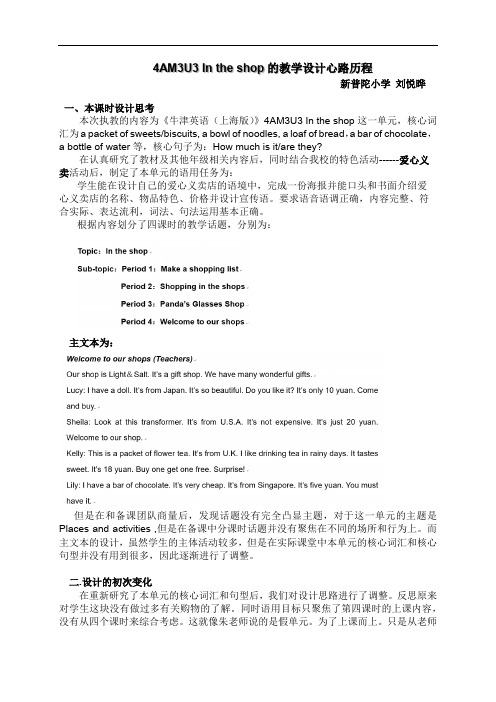
4AM3U3 In the shop的教学设计心路历程新普陀小学刘悦晔一、本课时设计思考本次执教的内容为《牛津英语(上海版)》4AM3U3 In the shop这一单元,核心词汇为a packet of sweets/biscuits, a bowl of noodles, a loaf of bread,a bar of chocolate,a bottle of water等,核心句子为:How much is it/are they?在认真研究了教材及其他年级相关内容后,同时结合我校的特色活动------爱心义卖活动后,制定了本单元的语用任务为:学生能在设计自己的爱心义卖店的语境中,完成一份海报并能口头和书面介绍爱心义卖店的名称、物品特色、价格并设计宣传语。
要求语音语调正确,内容完整、符合实际、表达流利,词法、句法运用基本正确。
根据内容划分了四课时的教学话题,分别为:主文本为:但是在和备课团队商量后,发现话题没有完全凸显主题,对于这一单元的主题是Places and activities ,但是在备课中分课时话题并没有聚焦在不同的场所和行为上。
而主文本的设计,虽然学生的主体活动较多,但是在实际课堂中本单元的核心词汇和核心句型并没有用到很多,因此逐渐进行了调整。
二.设计的初次变化在重新研究了本单元的核心词汇和句型后,我们对设计思路进行了调整。
反思原来对学生这块没有做过多有关购物的了解。
同时语用目标只聚焦了第四课时的上课内容,没有从四个课时来综合考虑。
这就像朱老师说的是假单元。
为了上课而上。
只是从老师的角度出发,教学哪些单词,词汇达到什么教学目标和语用目标。
所以我们最先做的就是设计了调查表,了解了学生平时爱去的购物场所和喜爱的购买的物品。
以及跟谁购物比较多,通常会在购物中说什么。
分课时话题、语用任务、主体文本调整为:Sub-topic:Period 1:Shopping in the food shopPeriod 2: Shopping in the supermarketPeriod 3:Shopping in Panda’s Glass shopPeriod 4:Shopping in special shops语用任务:在不同购物场所的语境中,学生能逐渐了解到如何根据购物的需求,选择相应的购物场所,能灵活运用本单元的核心词汇和句型完成买卖过程。
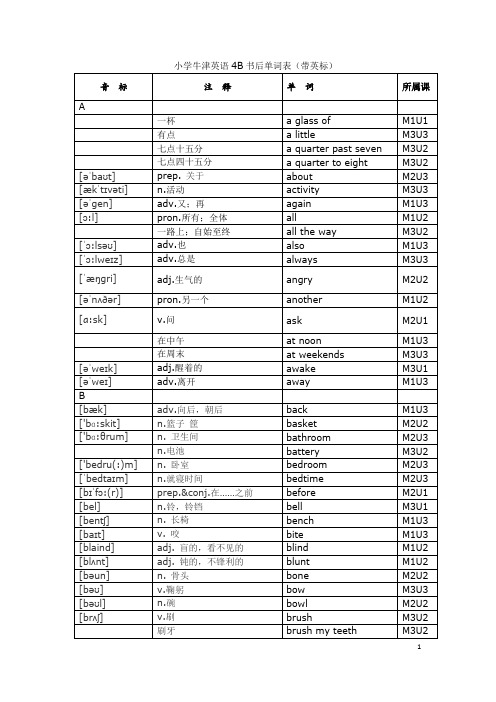
Oxford English 4B Module3 Unit2 Time教学设计Book : Oxford English 4B Module3 Unit2Period: 1Theme: TimeSchool: Shiyan Primary SchoolTeacher : Gu MinminStudents : Class 1,Grade 4Date: Apr. 2, 2011I.Teaching Project (教学项目)Phrases: a quarter past, a quarter to,get up, brush one’s teeth, wash one’s teeth, have breakfastSentences: What time is it? It’s…(time) What…doing?...be doing…Text:(1) One morning of KittyHello, I’m Kitty. I’m a girl from Beijing. I can tell the time. I arrange my time well. It’s Monday morning. I’m at home. It’s six o’clock. I’m getting up.It’s half past six. I’m having breakfast. It’s a quarter past seven. I’m going to school. I’m busy but I’m happy.(2) One morning of T onyLook! This is T ony. He’s a boy from London. He’s Kitty’s cousin. It’s Monday morning. It’s a sunny day. His bedroom is untidy. His dirty shoes are on his bed. His dirty trousers are under his bed.It’s seven o’clock. He’s getting up. It’s a quarter past seven. He’s brushing his teeth and wash ing his face. It’s half past seven. He’s having breakfast.It’s a quarter to eight. He’s looking for his socks.I t’s a quarter to nine. He found his socks and shoes. But where’s T ony?Oh, he is under the bed. What’s he doing? He’s looking for his books.It’s a quarter to ten. T ony is late for school. His teacher is angry. The children are laughing. He is wearing his father’s shoes. Look at his socks.One is long, the other is short. T ony is tired and sad.II. Teaching Aims (教学目标):A. Knowledge Aims (语言知识):1. 掌握a quarter past 与a quarter to的时间表达与区别,理解和运用这两个短语。
Oxford English 3A M3U3 In the park第一课时:Let’s go to the park!第二课时:We are in the park.第三课时:A story in the park.一.单元内容与要求二、单元教学目标❖知识与技能1、能够正确朗读字母包含‘u’的单词:pupil, tube等。
2、在In the park的语境中理解并学习本单元核心词汇:boat, balloon, flower, kite, red, orange, yellow.等。
3、在In the park的语境中能初步运用Look at…What colour is it? It’s…来对事物颜色进行问答。
4、在In the park的语境中能够熟练地运用核心句型What colour is it? 来询问、了解有关事物颜色的信息,并能够熟练运用核心句型It’s…进行回答。
5、在In the park的语境中能够尝试运用can, row a boat, smell the flower, swing, nice, fun, happy等词汇描述在公园中的快乐活动。
❖文化与情感通过在In the park语境中的学习,来激发学生热爱自然、亲近自然的品质,体验公园玩乐中的快乐。
❖学习策略1、通过听说读的方式,以语篇语境带动核心词句的学习。
2、以师生交流、生生交流的方式初步运用核心词汇和句型。
3、以角色扮演活动、小组交流活动等方法,进一步运用核心词汇和句型。
4.通过表演、描述等法,综合运用核心词汇和句型,提高语用能力。
【教学重难点】围绕在In the park的语境,熟练运用Look at…What colour is it? It’s…来对事物颜色进行问答,通过学习激发学生热爱自然、亲近自然的品质, 通过学习体验公园玩乐中的快乐。
三、学情与教材分析四.单课教学目标五、单课时的文本内容与教学过程Period 1 Let’s go to the park!一、第一课时文本主体学习文本:Let’s go to the park!Dad: Do you like the park?Kitty: Yes, I like the park! Look at the flower. It’s purple. How beautiful! Alice: Look at the tree. It’s green. How nice!Dad: Let’s go to the park!Kitty&Alice: Great!Dad: I have a kite.Kitty: What colour is it?Dad: Look! It’s orange.Kitty: Wow! How nice! I have a balloon.Alice: What colour is it?Kitty: Look! It’s blue.Alice: Wow! How beautiful! I have a boat.Dad: What colour is it?Alice: Look! It’s red.Dad: Wow! How cool!辅助文本辅助文本(一)White and red! What colour is it? I don’t know. White and red! What colour is it? It’s pink.辅助文本(二)Kite, kite. (boat)I have a kite. (boat)Colour the kite. (boat)DIY!预设输出语言:I have a …What colour is it?Look! It’s …Wow! How …!二、第一课时教学过程Period 2 We are in the park!一、第二课时主体学习文本第二课时辅助文本High up high,Swing to the sky.The sky is blue,I don’t know why.High up high,Swing to the sky.The sun is round,I don’t know why.High up high,Swing to the sky.The clouds are white,I don’t know why.第二课时预设输出语言: A: Look at the ____.What colour is it?B: It’s ___. (And we can _____.) A: Wow! How ____!三、第二课时教学过程教学反思:Period 3 A story in the park !一、第三课时文本主体学习文本:预设输出语言:A: Look at …’s ____.What colour is it?B: It’s ___. (And we can _____.)A: Wow! How ____!二、第三课时教学过程Procedures Contents Methods Purpose六、单元评价量表。
2013年浦东新区小学四年级英语新教材单元整体教学研讨(同本异构教学研究)主办:浦东教发院教师发展中心小学英语组承办:浦东新区福山外国语小学2013年4月24日Teaching Plan for Oxford English (Shanghai Edition)4B M3 U3 Days of the weekTeacher:Ni Jun倪君(福山外国语小学)Tang Jianxia 唐剑霞(福山外国语小学)Book:Oxford English (Shanghai Edition) 4B M3 U3 Days of the weekDate: 2013-04-24Teaching aids: Multi-media, word cards, flash, Work sheet, etc.教学设计说明学生情况分析:四年级学生活泼好动,有着强烈的求知欲与表现欲,对故事学习、对话表演等尤感兴趣。
经过了三年多的英语学习后,他们已经积累了一定的语言知识(包括词汇、语言结构与语法),对身边的人和事物产生着较为浓厚的关注度与兴趣,也具备了一定的听说读写能力。
在学习本单元内容之前,他们已经掌握了一周七天的星期表达,了解了不少场所以及可以进行的相关活动,具备了不同的感官感受;同时,他们也能较为熟练地运用to be、can句型、there be句型、一般现在时态的各种相关句型进行表达与交流。
模块教学任务分析:主题:Things around us单元:Unit 1 Sounds Unit 2 Time Unit 3 Days of the week4B M3的学习主题为Things around us(我们周围的事物)。
这个模块涉及到的词汇包括与声音相关的名词与形容词、频度副词、星期表达、时间类词组以及常见的日常生活类动词词组等;句型与时态包括to be句型、there be句型、一般现在时态(含各种句式)以及重点时态现在进行时态(着重于一般疑问句以及问答、特殊疑问句以及回答)。